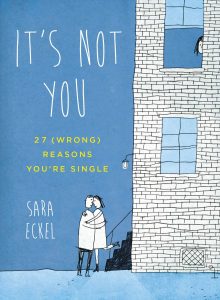To say that Valentine’s Day is not the easiest time of year for people to embrace the single life is an understatement.
Writer Sara Eckel knows that well. Since publishing an article in The New York Times’ Modern Love column and a subsequent book It’s Not You: 27 (Wrong) Reasons You Are Single in 2014, Eckel often hears from single people who wonder why things haven’t worked out for them. The answer, she always stresses, is not clear cut.
“There’s no reason you are single. You just are. You are single,” Eckel said. “What would it be like to take the ‘why’ out of it, to just say ‘OK, this is my life’?”
It took Eckel quite a bit of time to adopt this philosophy herself. It was only when she began studying Buddhism and yoga in the early 2000s that she began figuring out how to be content in a society that often stresses coupledom to the extreme.
Her studies also served as her introduction to the teachings of the American Tibetan Buddhist nun Pema Chödrön and the writer and psychotherapist Mark Epstein. Through her yoga instructors, she also began learning a new way to think about pain and suffering.

“I remember in that first yoga class [the instructor] had us in a really uncomfortable position, and there was a burning sensation in my thighs,” she recalled. “And he said, ‘Some of you might be feeling some discomfort right now, but what I would suggest is that you not label this sensation as pain, but take the label off of it and concentrate on what that really feels like.’ For some reason, that really clicked for me.”
Eckel began exploring those concepts more when she started writing her book and considering how women in particular are socialized to think about the single experience.
“You had to present that Sex and the City happy image—and sometimes that was true, but at other times it was really hard,” she noted.
In her book and her advice columns, Eckel stresses that admitting to yourself that there are negative aspects of being single is not the same as admitting defeat or giving in to hopelessness. Instead, she said, for her it did the opposite, by permitting her to look at the situation more clearly.
“A lot of people would like to have a partner,” she said. “Just allowing myself the complexity of my experience, that was a key thing that really helped me lighten up.”
Teaching your mind to detach pessimistic meanings from negative emotions also allows you to dig deeper into what you would really like to change about your situation, said Eckel.
“Whether it is heartache or loneliness, there’s something about it that if you can just relax into it and be curious about it, it’s surprisingly not as bad as all the resistance to it,” said Eckel.
Around Valentine’s Day, when singles are inundated with plastic cupids and shiny hearts every time they walk into their drugstore, viewing the world of dating through a more distant lens comes in particularly handy.
“That is a really great moment to practice self-compassion,” she noted. “It’s like you are going through your day and you’re fine, and all of the sudden it’s just this vomit of hearts and roses in everything. In that moment, take a minute, take a few deep breaths and say, ‘OK, I am having this feeling right now; it is not a pleasant feeling, but it will pass.’”
Contextualizing these emotions gives them less power, Eckel added.
“There’s the pain itself, but then there’s the double and triple layers of pain that we add when we say, ‘Why do I feel this way? I shouldn’t be feeling this way,’” Eckel said. “But if you just let yourself feel that pain—sure, it’s not fun, and it would be more fun to go on a great date—but there’s something about that experience which is kind of liberating.”
Finding the Middle Way in the Dating Scene

In a chapter from It’s Not You called “You Need An Action Plan,” which debunks the claim, Eckel turns to Buddhist teacher Ciprian Iancu for advice on navigating the dating scene and knowing when to put yourself out there and when to just relax:
We walked into the Manhattan bar, five women in their late thirties.
“See anyone?” one friend said.
We surveyed the room. Some couples, a group of women, a few guys who appeared far more interested in each other than any woman in the room. We shook our heads and moved on.
We repeated this three or four times until finally shoehorning ourselves into a crowded bar, where we drank bad merlot and stared into space, waiting for the time when we could go home and catch the Barbara Stanwyck marathon on TCM.
In other words, we were the embodiment of the worst singleton stereotype, a group of lonely, not-young women roaming from bar to bar, scanning each one like a police chief looking for a murder suspect.
But wasn’t that what we were supposed to do? Taking action, taking the reins? What would those who scoff have us do? Sit at home in our pajamas with the clicker?
The flip side to the magical-thinking prescription is the advice that tells women to treat the search for a husband with the same laser-pointed focus that you would a job or a cure for Parkinson’s. The beauty of this kind of advice is that it gives the illusion of control. You’re so busy with your twelve-point action plans and your group strategy sessions that even if you don’t find him tonight at least you know you’re being a good single-woman citizen. You are applying yourself! You are trying!
Until you find yourself flat-out exhausted from one too many joyless evenings of searching. So you say, you know what, screw this, and spend the next five Saturday nights in front of the television. If it never happens—well, at least you never had to hang out in a sports bar pretending to be interested in the Stanley Cup.But eventually, that makes you feel bad and you decide to get back “out there.” And the whole cycle begins again.
Still, there’s an interesting philosophical question in there: how do you find, as the yoga teachers say, the balance between effort and surrender?
I had a chance to ask Buddhist teacher Ciprian Iancu essentially that question. At a talk, he described a similar kind of night, as he offered the example of being in a bar at two thirty a.m., after you’ve had too much to drink and the person you have a crush on is not responding the way you’d like.
“Everything stopped being fun hours ago, but you stay, hoping you can suck just a little more fun out of the night,” he said.
This, he said, is the classic Buddhist definition of suffering: craving something you can’t have.
If you’re lucky, something snaps. You get a drink of water, call a cab. You go home. It’s not necessarily a happy moment, but it is the moment that you reclaim your dignity. It’s when you face the hard truth: Tonight is not the night. And maybe when you have an even deeper epiphany. I’m not going to be this person anymore. I’m sick of this shit.
The Buddhist view is that the cause of suffering is craving and ignorance. You’re looking outside of yourself for happiness. You’re not okay with the present reality. The path out of suffering is to accept things as they are and to allow whatever pain those circumstances cause you—loneliness, frustration, even self-loathing—to simply be there without judging them. When you start to see these feelings as simple sensation, sensations that will pass, you realize they’re manageable. It’s the thoughts around them that get us into trouble: What am I doing in this place where no one looks old enough to drive? Where did I go wrong? That’s the salt that we invariably put in the wound.
“But somethings it’s good to strive for things, right?” I asked Iancu. “You want a new job, so you send out résumés. You want a relationship, so you go out.”
“Absolutely,” he said. “Buddhism has no problem with going after things. The problem is not in the wanting; the problem is what happens when you don’t get what you want.” In other words, the problem is not saying “Gee, I hope we meet some cute guys tonight. Let’s go to a place where there’s a decent chance of that happening.” The problem is when we decide that if the evening doesn’t end with swapped cell-phone numbers or a weird back-alley make-out session, then it is a failure.
So how do you find that line? “Only you can know that,” said Iancu.
For me, the strategy was: Does this make me feel empowered or just exhausted?
♦
It’s Not You: 27 (Wrong) Reasons You’re Single by Sara Eckel, published by TarcherPerigee, an imprint of Penguin Publishing Group, a division of Penguin Random House, LLC. Copyright © 2014 by Sara Eckel.